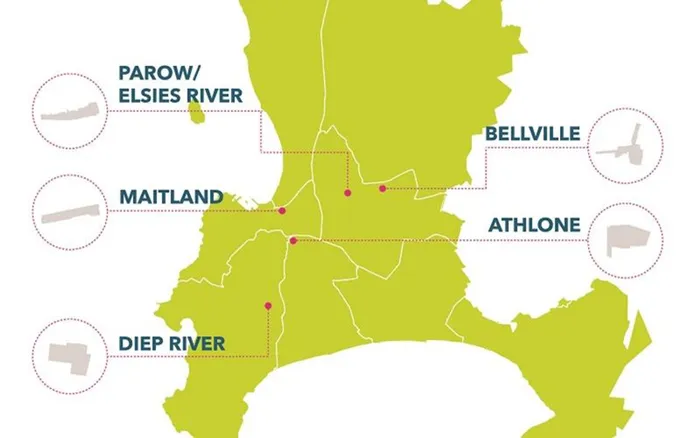City proposes changes to planning by-law

Key changes to the Municipal Planning By-law include the introduction of incentive overlay zones (IOZs) in five development focus areas: Athlone, Maitland, Parow/Elsies River, Bellville, and Diep River, as illustrated in the map. Picture: City of Cape Town
Property owners in almost 200 areas across the metro will be able to build eight to 12 flats on their residential plots without needing to seek land-use approval from the municipality if changes to a planning by-law are passed.
Several proposed changes to the Municipal Planning By-law will streamline development processes, encourage affordable housing and accommodate renewable energy advancements, says the City.
The public is encouraged to comment on the proposed changes by Monday September 23.
The proposed amendments aim to “make it easier to build and develop in Cape Town, improve clarity and certainty, encourage the development of affordable rental accommodation in identified areas, accommodate advancements in the renewable energy sector,” the City said in a statement.
The proposed amendments to the by-law are part of a five-year review process.
“For this review, many of the suggestions that we have received from the public over the past few years are reflected in the version that is now available for comment,” said mayoral committee member for spatial planning and environment Eddie Andrews.
Some of the revisions regulate the installation of renewable energy structures such as solar roof panels and wind turbines while others focus on housing.
“There is a huge demand for affordable rental accommodation in Cape Town and this time around, we are proposing additions to the by-law to stimulate development in this market in areas where the need is greatest; and we are also proposing an incentive overlay zone (IOZ) to encourage development in five development focus areas in Maitland, Diep River, Parow/Elsies River, Bellville, and Athlone,” Mr Andrews said.
According to the City, the proposed IOZs are intended to encourage private investment through enhanced development rights. These IOZs will assign additional development rights to properties within the zones, simplifying regulatory processes and encouraging mixed-use development.
“An IOZ creates a special zoning area with special provisions, over and above the base zoning's existing provisions. Property owners whose properties fall within an IOZ get additional or enhanced development rights, such as height, floor factor, coverage, setbacks and additional use rights. Should the new proposed development comply with the rules of the IOZ, only a building plan application is required,” the City said in a statement.
The full list of enhanced rules is available for viewing in items 155 and 156 of the proposed revised by-law that is available for public comment.
Key proposed changes to the by-law include:
• Amendments to the emergency housing provisions under Section 68 to enable the City to provide temporary housing on land that may not be zoned for such purpose for a period of 12 months without needing to undertake a public participation process beforehand if it is reasonable and justifiable, and complies with the Promotion of Administrative Justice Act.
• Amendments under Section 111 to allow the City to use email as the method of contacting and notifying interested and affected parties; that parties must provide the City with their email addresses and update these; and a person who does not have access to email may apply for notification by other means.
• New additions under Section 122 to promote effective law enforcement and lawful development by empowering the City to revoke or amend an approval or a building plan approval, to approve a replacement building plan and regularise a contravention, without the need for judicial review
• New additions under Section 135 to allow the City to impound moveable property that is being used for illegal building or demolition work if an order to stop work is being disobeyed.
• Revised or new definitions for “boarding house”, “guest house”, “hotel”, “affordable rental flat”, “affordable rental unit”, “commune”, “electric vehicle charging station”, “small-scale energy structure”, “medium-scale energy structure”, “micro wind turbine”, “outdoor restaurant dining area” and so forth.
• Single Residential zoning is renamed Residential Zoning (R1) and provides for single-family dwelling houses and additional use rights in low- to medium-density residential neighbourhoods.
• New primary uses for R1 are proposed such as electric vehicle charging stations, small-scale energy structures, and micro wind turbines.
• Additional use rights for R1 are proposed, including affordable rental flats, supplementary dwelling units, and place of instruction.
• An “affordable rental flat” is a new proposed additional use right on properties within 194 identified areas across Cape Town to enable the development of small scale affordable rental accommodation in these areas. It is proposed that the number of small scale affordable rental units on a single property may not exceed eight units plus a dwelling house, or 12 units if there is no dwelling house on the land. A map of the proposed 194 areas is available online, and residents are encouraged to peruse the map and to submit their comments.
Public information days will be held in the areas where the IOZs are proposed:
• Bellville: Saturday August 3, from 9am to 1pm at the Bellville Library Auditorium.
• Parow/Elsies River: Saturday August 17, from 10am to 2pm at the Parow Civic Centre.
• Diep River: Saturday August 17, from 10am to 2pm at the New Council Chamber, Alphen Centre.
• Athlone CBD: Saturday August 24, from 9am to 1pm at the Athlone Library.
• Maitland: Saturday August 31, from 10am to 2pm, at the Maitland Town Hall.
The proposed revised Municipal Planning By-law, maps of the proposed IOZs and other relevant documents are available on the City's website.
Comments can be made online at www.capetown.gov.za/haveyoursay or by email to Lums@capetown.gov.za
Related Topics: